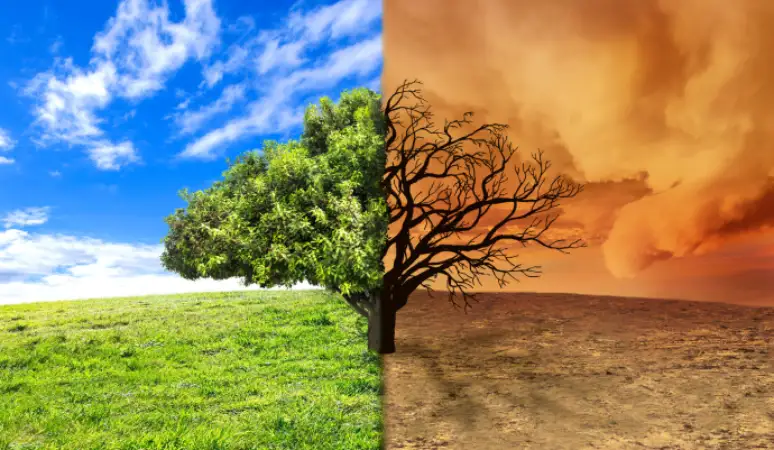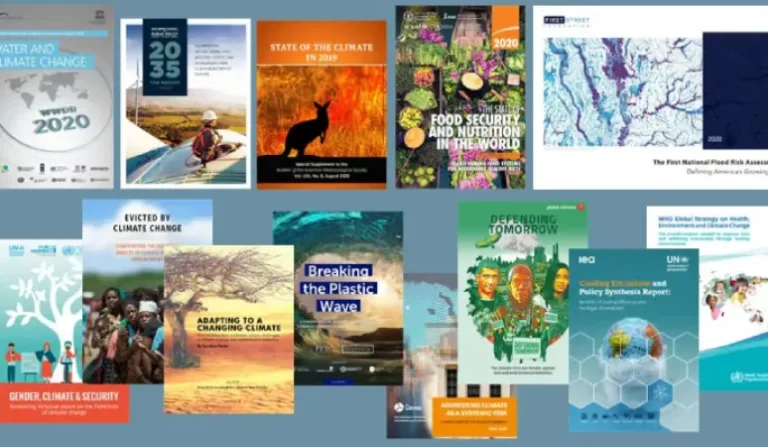In today’s rapidly evolving world, Climate Change Reporting has never been more critical. As we face unprecedented environmental challenges, accurate and timely reporting on climate change offers a lifeline to understanding the impact of our actions and the urgent need for sustainable solutions. This type of reporting not only highlights the stark realities of global warming but also, at the same time, showcases innovative approaches and hopeful initiatives that can drive meaningful change. By staying informed through comprehensive Climate Change Reporting, we empower ourselves and our communities to take decisive action in the fight against climate change.
The complexities of climate science, combined with the politically charged nature of the topic, make accurate and compelling climate reporting a particularly challenging task. Journalists must navigate a landscape filled with misinformation, varying levels of public understanding, and powerful interests that may seek to downplay the severity of the issue Furthermore, the need to convey scientific data in an accessible and engaging manner also adds complexity to the task, ultimately creating another layer of difficulty
Climate Change Reporting: Understanding Its Importance
Climate Change Reporting helps us understand this problem better. It tells us what’s happening with our climate and what we can do about it. By learning from these reports, we can take action to help our Earth.
What is Climate Change Reporting?
Climate Change Reporting involves gathering information about how the climate is changing. This can include data on rising temperatures, melting ice, and extreme weather. Scientists, journalists, and environmental groups collect and share this information. They do this through news articles, reports, and websites.
This reporting helps us see the impact of climate change. For example, we learn about the effects of global warming on polar bears or how storms are getting stronger. Understanding these changes is important for finding solutions.
Why is Climate Change Reporting Important?
Climate Change Reporting is crucial because it raises awareness. When people know about climate change, they are more likely to care and act. Reports provide evidence of the problems and show the need for change.
Furthermore, these reports can influence decisions made by governments and businesses. If leaders see the urgent need for action, they might create new policies or support eco-friendly projects. This helps in the fight against climate change.
How Does Climate Change Reporting Help Us?
First, Climate Change Reporting educates us. It gives us the facts about what’s happening with our climate. By reading these reports, we learn about the causes and effects of climate change.
Second, it inspires action. Many reports include suggestions for how we can help. They might suggest reducing waste, using less energy, or supporting clean energy sources. Following these suggestions can make a big difference.
Finally, reporting helps us track progress. It shows if efforts to combat climate change are working. This information is important for keeping everyone informed and motivated.
Key Components of Climate Change Reporting
Data Collection
The first step in Climate Change Reporting is gathering data. Scientists use tools like satellites and weather stations to collect information. This data includes temperature changes, ice levels, and greenhouse gas emissions.
Next, the data is analyzed. Experts look for patterns and trends. This helps them understand how the climate is changing over time. Accurate data is essential for creating reliable reports.
Analysis and Interpretation
After collecting the data, it’s time for analysis. Scientists and reporters study the information to see what it means. They look at how different factors are related and what they reveal about climate change.
Interpreting the data can be challenging. It requires understanding complex scientific concepts and presenting them in a clear way. The goal is to make the information easy to understand for everyone.
Reporting and Communication
Once the data is analyzed, it’s reported to the public. This is done through articles, news stories, and reports. Effective communication is key. The information must be presented in a way that is engaging and easy to understand.
Additionally, visuals like charts and graphs can help explain the data. They make it easier to see trends and changes. Clear and honest reporting helps build trust and ensures that the public gets accurate information.

Challenges in Climate Change Reporting
While Climate Change Reporting is vital, it faces several challenges. One of the biggest is the complexity of the data. Climate science involves intricate systems and interactions, which makes it challenging to explain in simple terms. Consequently, reporters must carefully balance accuracy with clarity, ensuring that the information is not only scientifically sound but also easy to understand.
Another challenge is the potential for misinformation. Inaccurate or biased reports can lead to misunderstanding or skepticism about climate change. It’s essential for reporters to rely on credible sources and to present the facts without distortion. This helps maintain public trust and encourages informed decision-making.
Moreover, there’s the issue of coverage. Not all regions and communities receive the same level of attention in climate reports. Often, the focus is on areas experiencing the most dramatic changes, while others may be overlooked. Ensuring comprehensive coverage that includes diverse perspectives is crucial for a complete understanding of the global impact of climate change.
The Role of Media in Climate Change Reporting
The media plays a critical role in Climate Change Reporting. It serves as a bridge between scientists and the public, translating complex scientific findings into accessible information. By highlighting the urgency of the climate crisis, the media can drive public discourse and influence policy decisions.
Media outlets have the power to shape narratives around climate change. They can choose which stories to highlight and how to present them. Responsible reporting should focus on the facts, avoid sensationalism, and provide context for the information being shared. This approach helps the audience understand the significance of the issue and the need for action.
Additionally, the media can amplify the voices of those most affected by climate change. This includes communities in vulnerable regions, indigenous peoples, and younger generations who will inherit the consequences of today’s actions. Giving a platform to these voices helps build a more inclusive and equitable conversation about climate change.
The Impact of Climate Change Reporting on Public Perception
Climate Change Reporting significantly influences public perception of the issue. Well-researched and accurately presented reports can increase awareness and understanding, leading to greater concern and a desire for action. When people are informed about the realities of climate change, they are more likely to support policies and initiatives aimed at addressing it.
Conversely, poor reporting can contribute to confusion or apathy. If the information is presented in a way that is overly complex, biased, or contradictory, it may lead to skepticism or disengagement. Therefore, it’s essential for reports to be clear, accurate, and consistent in their messaging.
The impact of Climate Change Reporting extends beyond individual understanding. It also significantly influences societal attitudes and behaviors. For instance, widespread reporting on the dangers of plastic pollution has, as a result, led to increased public pressure on companies to reduce plastic waste. Similarly, reports on the benefits of renewable energy have, in turn, encouraged more people to adopt eco-friendly practices in their daily lives.
The Future of Climate Change Reporting
As the climate crisis intensifies, the need for effective Climate Change Reporting will continue to grow. In the future, this reporting will likely involve more advanced data collection methods. For example, technologies like artificial intelligence and machine learning will likely become more prominent as tools to analyze complex climate models.. These technologies can help provide more accurate predictions and insights into the impacts of climate change.
Moreover, the rise of digital media offers new opportunities for reaching wider audiences. Social media platforms, podcasts, and online news sites allow for more dynamic and interactive forms of reporting. This can help engage younger audiences and foster a deeper understanding of the issue.
However, with these advancements come new responsibilities. Reporters must ensure that the information they share is reliable and that they are not contributing to the spread of misinformation. This will require ongoing education and training in both climate science and journalistic ethics.
FAQ
Q: What is the purpose of Climate Change Reporting?
Climate Change Reporting aims to inform the public about the ongoing changes in our climate, the effects of these changes, and potential solutions to mitigate the impact.
Q: Who is responsible for Climate Change Reporting?
Climate Change Reporting is conducted by scientists, journalists, environmental organizations, and sometimes government agencies. They collect, analyze, and communicate data related to climate change.
Q: How does Climate Change Reporting influence public opinion?
Accurate reporting increases awareness and understanding, leading to greater concern and support for actions to address climate change. Poor reporting, on the other hand, can lead to confusion or skepticism.
Q: What challenges do reporters face in Climate Change Reporting?
Reporters face challenges like explaining complex data, avoiding misinformation, and ensuring comprehensive coverage that includes diverse perspectives.
Q: How can media improve Climate Change Reporting?
Media can improve reporting by focusing on accuracy, avoiding sensationalism, providing context, and amplifying the voices of those most affected by climate change.
Q: Why is accurate data important in Climate Change Reporting?
Accurate data is crucial because it forms the basis of reliable reports. It helps in understanding the extent of climate change and in developing effective solutions.
Q: What is the future of Climate Change Reporting?
The future will likely involve advanced technologies for data analysis and more digital media engagement, which will require ongoing education and ethical considerations for reporters.
Conclusion: The Importance of Climate Change Reporting
Climate Change Reporting is an essential tool in the fight against global warming. By providing accurate and timely information, it helps raise awareness, inspire action, and guide policy decisions. The challenges faced by reporters in this field are significant, but so are the rewards. Effective reporting can lead to greater public understanding and support for the measures needed to address the climate crisis.
As we move forward, the role of Climate Change Reporting will become even more critical. With the right tools and approaches, reporters can continue to play a vital role in shaping the global response to climate change. By staying committed to accuracy, inclusivity, and clear communication, they can help ensure that the world is informed and ready to take action.
Climate Change Reporting plays a vital role in our understanding of climate issues. It provides valuable information that helps us learn, act, and track progress. By paying attention to these reports, we can all contribute to protecting our planet and ensuring a healthier future.
